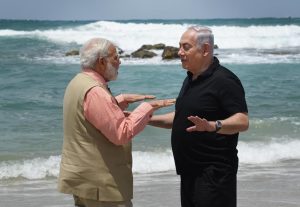Last week, on the verge of Israel’s military operation against the southern Gaza town of Rafah, Indian media outlets reported that the Israeli army was set to induct Indian-made drones into its burgeoning surveillance and aerial bombing fleet. The development was a stark escalation of India’s role in the Israeli war effort and a sign of its heightened risk appetite in the Middle East.
In recent years, India’s Prime Minister Narendra Modi has overseen a wholehearted pivot toward Israel, driven by a series of strategic, economic, and ideological imperatives.
In the aftermath of the October 7 attacks, Modi was among the first world leaders to issue a statement of “solidarity with Israel,” even before Washington and others had reacted. Several thousand Indian workers then migrated to Israel amid a labor shortage in that country, after Israel had canceled the work permits of Palestinian laborers from Gaza.
Yet, despite this bonhomie, New Delhi’s diplomatic rhetoric on the Gaza war has long been restrained. India has officially maintained a position of neutrality on Israel’s response to the October 7 attacks and has often reiterated its traditional policy in favor of a separate state in Palestine. Last December, India voted at the United Nations in favor of an immediate ceasefire in Gaza — in opposition to Israel and the United States.
A predominant reason for India adopting this diplomatic rhetoric is its relationships with the Gulf. Despite growing ties with Israel for the last several years, New Delhi has been wary of revising its position on Palestine and alienating the Gulf states, which account for a significant proportion of India’s crude oil imports and host millions of Indian expats. While reports of the drone transfer were doing the rounds last week, Modi was on a momentous tour of the United Arab Emirates and Qatar. In Abu Dhabi, Modi inaugurated a Hindu temple, the first in that country. Then, he traveled to Doha for his first state visit to Qatar in eight years.
If reports on the drone transfer are accurate, it would mean that New Delhi is now willing to take bigger risks in advancing its partnership with Israel. Some of that is a result of recent events, which perhaps have convinced New Delhi that it has sufficient economic clout to take on those risks.
Take what happened almost two years ago in Doha. In 2022, eight former officers of the Indian Navy were arrested on undisclosed charges and sentenced to death by a Qatari court. The arrests and conviction strained Qatar’s ties with India, and New Delhi lobbied heavily on behalf of the former naval officers.
After much pressure and negotiation over the last several months, Qatar finally relented. Last week, ahead of Modi’s visit to Doha, Qatari authorities released the eight men and repatriated them to India.
Neither Qatar nor India has publicly addressed why the former officers were arrested or released. But media reports said that the men worked for a private defense consulting firm based in Qatar and had been accused of sharing sensitive documents with the Israeli government. In the aftermath of that case, Qatar shut down the consulting firm and evicted over 75 Indian employees who had worked for it.
There were some significant economic events in the background. The release of the former Indian officers came on the heels of a major energy agreement under which Qatar would sell 7.5 million tons of liquified natural gas per year to India for the next 20 years. Days later, Modi was in Doha, where he gave Qatar’s ruler a “commitment to further expanding and deepening bilateral cooperation.”
New Delhi has perhaps calculated from that and other similar events that it can now afford to be more adventurous in its embrace of Israel. India’s burgeoning demographic advantage and immense energy needs have coincided with problems for Arab oil exporters elsewhere: In the West, the United States’ shale revolution and a planned shift away from fossil fuels have undercut the Gulf’s export interests. In China, years of over-investment have led to an economic crisis and a painful restructuring. Under the circumstances, India appears to be the most reasonable long-term bet as a market for Gulf crude.
But leverage always cuts both ways. If India is perceived as an accessory to atrocities in Gaza, that could imperil the millions of Indians who live and work across the Arab world. To that end, at least in diplomatic rhetoric, New Delhi seems unlikely to change its position on Palestine.

































